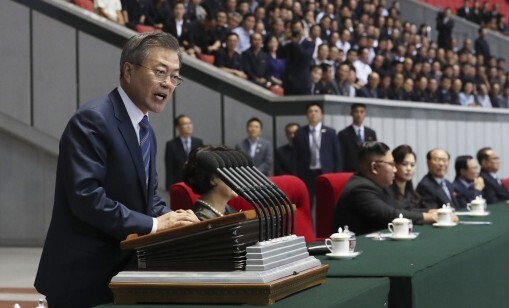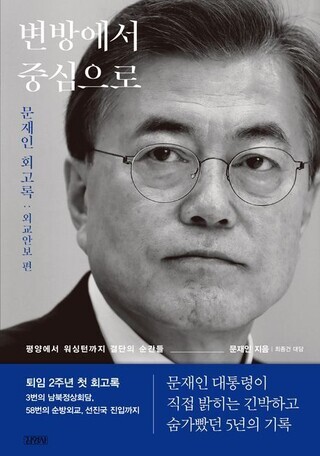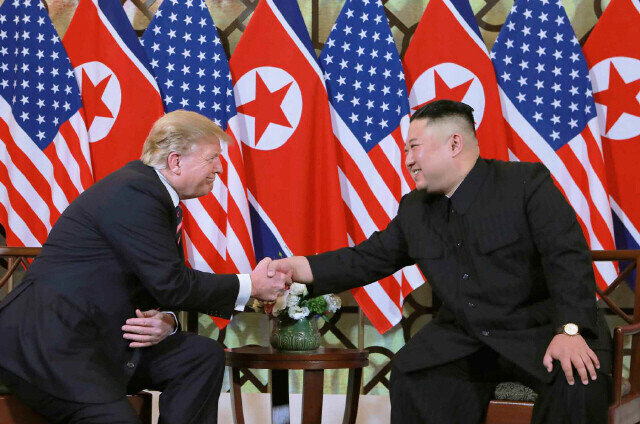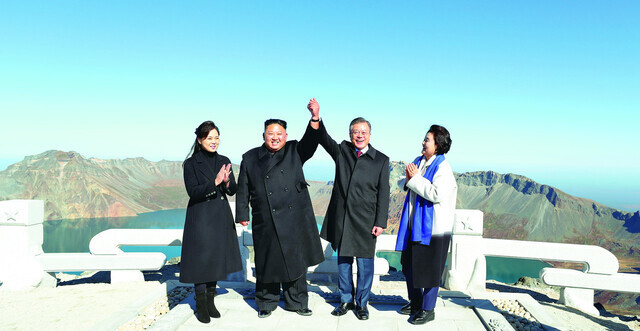hankyoreh
Links to other country sites 다른 나라 사이트 링크
Kim Jong-un wanted to meet with residents of shelled Yeonpyeong Island in South, Moon recalls in memoir

Some of the more interesting tidbits in Moon Jae-in’s new memoir are that North Korean leader Kim Jong-un said he wanted to communicate by email because he always carries his laptop with him on trips to the provinces and that Kim had hoped to visit Yeonpyeong Island to console the residents there.
In his first memoir “From the Frontier to the Center,” published two years after leaving office, the former president provided a behind-the-scenes account of the fast-paced diplomacy that led to three inter-Korean summits and two Pyongyang-Washington summits. The book hit shelves on Friday.
When Moon urged Kim in their second summit on May 26, 2018, to activate the hotline installed in their respective offices, Kim suggested they communicate by email instead since he was usually making the rounds of the provinces and was only in his office a couple of times a week. Moon said that he agreed to Kim’s suggestion, but that email communication never actually took place “because the North Koreans kept delaying the development of a security system.”
Moon also said that when the two leaders were discussing the possibility of Kim making a reciprocal visit to South Korea after Moon’s visit to Pyongyang on Sept. 19 of that same year, Kim had been very keen about going to Mount Halla, on Jeju Island.

“[Kim] had also said he wanted to ride the KTX [high-speed railroad], so we looked into the option of him traveling on that. One unexpected thing was that Kim said he wanted to visit Yeonpyeong Island at some point to console the residents who had suffered due to [the North’s] bombardment of the island,” Moon also recalled.
Moon stressed that Kim had said his nuclear arsenal was strictly intended as a security guarantee and had repeatedly expressed his fervent commitment to denuclearization, while declaring “he had absolutely no intention of using” his nuclear weapons.
Kim’s inconclusive second summit with Donald Trump was held in Hanoi, but Kim had initially wanted it held somewhere he could reach by train, such as Panmunjom or Mongolia. According to Moon, Kim had even suggested holding the summit aboard an American aircraft carrier or another large ship moored in North Korean waters.
“Kim flew aboard a Chinese airplane to Singapore [for his first summit with Trump], but he was very uncomfortable with that,” Moon remarked.
Negotiations broke down in Kim’s second summit with Trump, which was ultimately held in Hanoi at the US’ request, and the North Korean nuclear issue has continued to deteriorate since then. Moon lamented that as a “missed opportunity.”
“To be sure, there are lingering questions about whether we ought to have been more proactive about reaching a breakthrough in that situation,” Moon said, while also noting that “North Korea’s apparent treatment of inter-Korean relations as subordinate to dialogue with the US is very unfortunate given its constant refrain about handling things ‘among us Koreans.’”

Moon said that North Korea’s demolition of the Inter-Korean Liaison Office on June 16, 2020, was “a truly awful incident.”
“I think that if another administration eventually engages in dialogue with North Korea down the road, they should definitely get an apology for that,” he remarked.
As for Donald Trump, the former US president who was Moon’s primary diplomatic counterpart while in office, Moon noted that “some regarded him as uncouth and unpolished, but I liked his candor” and added that “Seoul-Washington relations were more robust [under Trump] than under any previous administration.”
Regarding the matter of South Korea’s share of defense costs, he recalled, “Because President Trump’s demands were so excessive, there was no progress in negotiations for a long time, and I even ordered a suspension of the negotiations.” At the same time, he stressed, “There were no difficulties in bilateral relationships or my relationship with President Trump as a result.”
After the Hanoi summit’s failure to produce a deal, he noted, “President Trump himself later apologized to me and told me he regretted it.”
“He said that while he was willing to accept [Kim Jong-un’s proposal], national security adviser Bolton was dead set against it, and Secretary Pompeo supported Bolton, which left his hands tied,” he explained.
In contrast, Moon was more critical of the late former Japanese Prime Minister Shinzo Abe.
“When you met him, he appeared pleasant and spoke gently, but when you turned around, there was no progress whatsoever,” he recalled.
He also explained that while he suggested several potential solutions later in his term for Japan’s controls on exports to South Korea and matters relating to forced labor mobilization survivors and their families, Abe’s office rejected all of them.
“The reports I received regarding the Japanese government were that we would have positive discussions and approach an agreement at the working level, but once things reached the prime minister’s office, they obstinately refused,” he said.
“That is how much of a hard-right position Prime Minister Abe was taking on these issues,” he explained.

Commenting on the administration of his successor Yoon Suk-yeol, he said, “The excessively ideological stance of this administration with its abandonment of strategic ambiguity has compounded our diplomatic difficulties.”
“North Korea’s provocations are concerning, but the current administration’s response has been excessive,” he commented. “Even as the sense of crisis has intensified, we have seen no efforts at all to reduce the crisis through dialogue.”
Regarding the controversy over the relocation of a statue of Hong Beom-do, a Korean independence fighter, he said, “Conservatism is about valuing the nation, valuing the community, and valuing patriotism, and the figure who best represents those values is General Hong Beom-do.”
“I cannot comprehend how they not only do not treat such figures with respect but disparage them and tear down statues that have been raised [in their honor],” he added.
Assessing his own administration’s diplomatic activities, Moon said, “I think we can boast that we produced the best results to be seen in balanced diplomacy.”
Commenting on the more perilous state of the North Korean nuclear issue and inter-Korean relations, he said, “The very structure of inter-Korean dialogue has changed as North Korea’s nuclear and missile capabilities have advanced.”
“Since we [South Koreans] are the ones with the sense of urgency and the need to resolve the matter quickly, there is no other way but for us to take the lead in inter-Korean dialogue and use that to achieve North Korea-US dialogue,” he stressed.
The format for the memoirs consisted of Moon’s replies to questions posed by Choi Jong-kun, a Yonsei University professor and Moon’s former vice minister of foreign affairs, who played a key role in foreign affairs and national security under his administration.
Choi explained that he began working on the memoirs in May 2023 at Moon’s suggestion.
Advance orders for the book began at online booksellers on May 10. It is currently attracting major buzz, ranking first on Kyobo Book Centre’s bestseller list in politics and social sciences.
By Park Min-hee, senior staff writer
Please direct questions or comments to [english@hani.co.kr]

Editorial・opinion
![[Editorial] Silence won’t save Yoon [Editorial] Silence won’t save Yoon](https://flexible.img.hani.co.kr/flexible/normal/500/300/imgdb/original/2024/0701/681719819632087.jpg) [Editorial] Silence won’t save Yoon
[Editorial] Silence won’t save Yoon![[Column] The miscalculations that started the Korean War mustn’t be repeated [Column] The miscalculations that started the Korean War mustn’t be repeated](https://flexible.img.hani.co.kr/flexible/normal/500/300/imgdb/original/2024/0630/9717197068967684.jpg) [Column] The miscalculations that started the Korean War mustn’t be repeated
[Column] The miscalculations that started the Korean War mustn’t be repeated- [Correspondent’s column] China-Europe relations tested once more by EV war
- [Correspondent’s column] Who really created the new ‘axis of evil’?
- [Editorial] Exploiting foreign domestic workers won’t solve Korea’s birth rate problem
- [Column] Kim and Putin’s new world order
- [Editorial] Workplace hazards can be prevented — why weren’t they this time?
- [Editorial] Seoul failed to use diplomacy with Moscow — now it’s resorting to threats
- [Column] Balloons, drones, wiretapping… Yongsan’s got it all!
- [Editorial] It’s time for us all to rethink our approach to North Korea
Most viewed articles
- 1Japan is building a military meant for more than self-defense — and has the US to thank for it
- 2Yoon’s prosecutors are throwing everything at the president’s opponents to see what’ll stick
- 3[Editorial] Silence won’t save Yoon
- 4NewJeans rocks Tokyo Dome as new, younger generation of K-pop fans emerges in Japan
- 5[Column] The miscalculations that started the Korean War mustn’t be repeated
- 6Dreams of a better life brought them to Korea — then a tragic fire tore them apart
- 7[Editorial] Exploiting foreign domestic workers won’t solve Korea’s birth rate problem
- 8Moscow tells Seoul to rethink ‘confrontational course’
- 9How million-strong candlelight demonstrations are being organized
- 10“You are not alone”: Sister of Sewol ferry tragedy victim’s letter to Itaewon survivors